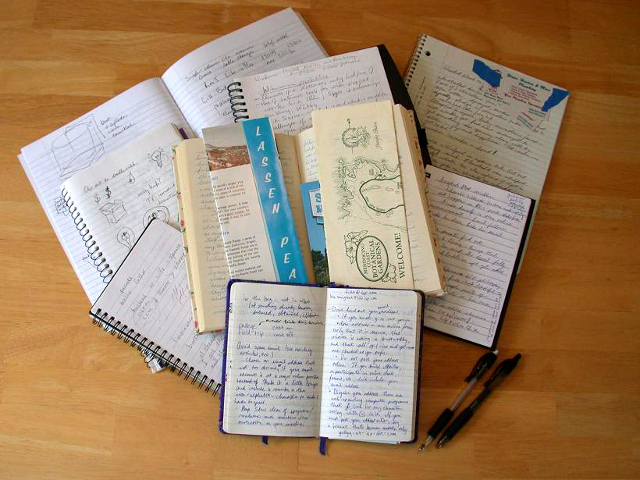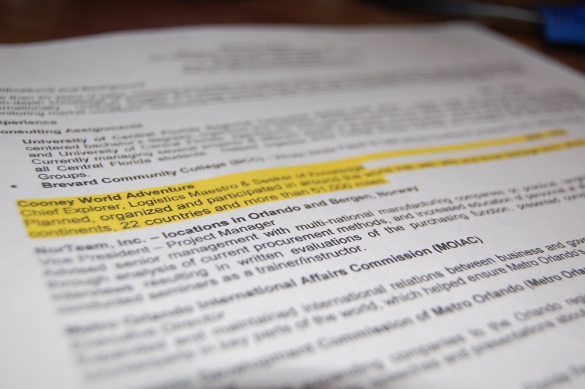Long term, RTW travel is filled with various myths. Haters gonna hate, so you’re most likely going to be met with a bit of resistance from people, particularly if you’re from a country where long term travel is not embraced or understood (cough, United States, cough). We’re here to inform you that most of these myths are exactly what a myth is defined as – a widely held, but false, belief or idea.
Plenty of people have traveled round the world. Plenty of people are doing it right now. Plenty of people are planning. But even more are dreaming. Many of those in the dreaming stage think it’s impossible and come up with a myriad of reasons why they can’t do it.
While you’re making excuses, just ponder one thing – when you’re on your death bed, do you think you’ll say, “Boy, I sure wish I’d spent more time at the office!”?
Here are a few of the common myths of travel, and what we at BootsnAll think of them:
Myth: “I don’t have time to travel around the world!”

We reckon that if you think it’s worthwhile, you’ll make the time. That’s how everything in life is, and travel is no exception. You can make your RTW trip as long or as short as you want. There is no magic schedule. Yes, we know travelers who take 6 months or a year or more for their trip, but we also know many people who take a month or two and have an amazing trip. You can hit major cities and destinations all over the world in as little as a month. Time is as much of a factor as you make it. To look at it another way, a job or career might last 30-odd years, but the experiences gained from some time spent outside your comfort zone will last a lifetime. As Mahatma Gandhi said, “There is more to life than increasing its speed.”
We know there are certain countries and cultures who embrace long term, RTW travel and those who don’t. If you’re in one of those countries that doesn’t typically embrace this type of travel, you’re not out of luck. While the United States isn’t leading the charge in RTW travel, it is at least (finally) being talked about, discussed, and realized as a viable option for people in the middle of their careers. Organizations like Meet, Plan, Go! encourage taking career breaks and sabbaticals, and their goal is to see a career break on every resume.
As Mahatma Gandhi said, ‘There is more to life than increasing its speed.’
You may think you don’t have any options, but you do. You can ask for unpaid leave from your job (and in this still down economy, you may be surprised that your employer might grant it – that means one less layoff). If you hate your job or career and have always pondered a change, take this opportunity to do it. What better way to reassess your life than by taking time to travel the world? Who knows, you may find a long lost passion you forgot you had. Or you may fall in love with a new career or job opportunity along the way. People seem to make time for things they are passionate about, and if you’re passionate about RTW travel, then make it your top priority and find the time.
Back to Top
Myth: “I can’t afford that kind of trip!”

We reckon that you can travel around the world for a fraction of the cost you’re imagining. Look at it another way – in the U.S., the average compact car costs, what, $10,000-$15,00 or so? If you want to own your home, it’s good to have a hefty down payment these days. At least 10% is advisable, so if you purchase a $200,000 home, you’ll need to come up with at least $20,000 (then you’ll have monthly mortgage payments, taxes, and upkeep, not to mention furnishing it).
In 2011-2012, “the average net cost for a full-time student at an in-state public university was about $15,000 for tuition, fees, room, board, books and incidental expenses,” and if you go private, you’re talking tens of thousands of dollars. It’s actually cheaper to travel the world than it is to buy any of the things deemed “necessities” by modern, western society.
It’s really all about priorities, no different than saving for any other big purchase/life event, like saving for a house, a car, college, having children. If you can’t save for a long-term trip, then you’re basically saying you can’t save for any of the above either.
When you break down the three main things you spend money on while traveling – food, accommodation and transportation – you find it’s possible to spend very little while traveling. You can often get meals for under a dollar at local markets and food vendors in regions like Southeast Asia, India, and the Middle East. Accommodation is almost always available, and local guest houses and hostels are often very affordable. Joining the couch surfing community is a great way to save money on accommodation and see the city you’re visiting from a local’s perspective. Airfare is going to be the biggest expense, but a RTW plane ticket can cost as little as $2,000, and local transport (buses, train, boats) provides affordable means of getting around and seeing a country as the locals do.
It’s actually cheaper to travel the world than it is to buy any of the things deemed “necessities” by modern, western society.
If you’re willing to try to be smart with your money – you know, budget, like you would for a car, a house, or an education – you can travel around the world. Go where cars are unnecessary; learn and gain experiences that you could never get in a classroom. Traveling around the world is something that just about anyone can do, and that just about anyone can afford.
Check out these top rewards credit cards to help earn free travel before leaving for your trip.
Back to Top
Myth: “There’s just too much planning involved!”

We reckon there is only as much planning as you really want to do. Remember not to plan too much, though; your plan might get a little wrinkled in a place like India, where life definitely does not run according to a schedule. Read about the places you’re going, learn about the culture, and pencil in areas you’d like to visit. After that, your best bet is to relax and enjoy your trip, without stressing over the itinerary.
Thinking of planning a RTW trip? Don’t know where to start? Sign up today for Plan Your RTW Trip in 30 Days and start receiving email lesson plans tomorrow – it’s free! You’ll be on the road before you know it!
![]()
Your flights are going to be the biggest expense on your trip, and there are lots of options out there. Deciding whether to buy a RTW plane ticket or point to point tickets is a big decision. We have tons of data on this subject, and with our new multi-stop international flight booking tool, you may not have to make that decision anymore. Indie gives you the best of both worlds.
Once you’re in a country, you’ll find transport to get you where you want to go. You will have the space to explore and adventures will happen more freely – and we also hear that the best things happened when people did things they actually had not planned to do.
We’ve talked to lots of people who have traveled around the world. Some travelers say they plan, prepare and research down to the Nth degree. We’ve also heard of people packing a bag, buying a ticket, and just going. If you have just the most basic idea of where you want to go – or at least where you want to leave from – then you’re already on your way.
Check out these 65 links, from BootsnAll and around the web, to help you plan your trip.
Back to Top
Myth: “There’s no way to pack everything you need into one pack.”

We reckon you need to look closely at what you’re taking. Some folks buy every fancy gizmo, from self-inflating bus pillows to re-usable toilet paper, and wonder why their pack weighs 70 pounds. There is one huge misconception that first time international travelers have – that you need to plan for every possibility. Just take the basics and buy what you need while you’re there. People in other parts of the world need band aids and condoms and toothpaste just like we do at home.
This is especially true when it comes to clothes. Remember, people living outside of your home country typically wear clothes, too, and clothing items from around the world can make for great souvenirs and conversation pieces when you come home (a Chang beer tank top from Thailand becomes a fun part of your regular summer wardrobe back home). You rarely have to look far for cheap T-shirts and such. And remember that if you can’t find a particular something, but the thousands of people around you get by without it just fine, you probably will, too.
If you’ve never packed light before, now’s the time to start. Laundry services are easy and cheap to find in many places around the world, particularly in developing countries, so there’s simply no need to bring 15 different outfits. Lugging all your gear from planes to hostels to trains to buses gets tiresome, and if you pack super light, you’ll be thankful. It’s sadly comical to see a traveler struggling with their packed-to-the-gills 85 liter pack while traipsing the staircases of Cusco looking for a hostel. Don’t be that guy (or gal)!
Find out what type of gear the BootsnAll community recommends.
Back to Top
Myth: “You can’t eat the food or drink the water without getting sick.”

We reckon common sense plays a large part. People who live in those areas have to eat the food and drink the water, so it can’t be all bad. Find out what the dangers are, and be careful. It is true that the water is unsafe to drink in many areas of the world. Unfortunately, that often means bottled water, but when the water is unsafe to drink, bottled water is usually very cheap. (You can also opt for something like a SteriPen, reusing your own portable water bottle and making water safe to drink wherever you go.) Finding out whether the water is safe or not isn’t difficult, but when in doubt, err on the side of caution.
When it comes to food, it’s usually about common sense. Street food carts and eating at markets is extremely common in many parts of the world. In places like Southeast Asia, not only is street food super cheap (meals for less than a dollar in many places), but it’s also some of the best-tasting food around – local, fresh, and cheap. What more can you ask for? When it comes to eating from food carts and at markets, use the same caution you do at home. If you walk into a restaurant that’s empty and dirty, you probably won’t eat there, right? The same goes for street carts and market food. If there are a lot of people eating there (particularly locals), and the cooking area is nice and clean, then you’re probably going to be fine.
While it may take your stomach a bit of time to get used to the new food or spices, if you exercise some caution, you should be perfectly safe. But remember, just like home, food poisoning and sickness from eating something in particular is always possible. (This is, incidentally, one of the reasons you’ll be glad you got travel medical insurance, in case you need to visit a doctor abroad for something more serious than a mild bellyache.)
Read about Staying Healthy on the Road
Back to Top
Myth “The world is too scary and dangerous to travel all over it!”

We reckon the world is no more scary than it is friendly and welcoming. There are some trouble spots you want to avoid (just like at home), but generally people are friendly and don’t hold a grudge against individuals of other countries. In plenty of developing countries you’ll see women and children walking around at night without fear, and there’s no reason to think you are in any more danger. Keeping your wits, following your instincts, and doing your research should help keep you out of trouble and harm.
Travelers male and female, old and young, rich and poor, from every country and flag and stripe and walk of life, have told us over and over of the friendliness, hospitality and welcome they have received from people the world over. Traveling can be scary, yes, especially when you’ve never taken such a trip before. But it can be done. We know thousands of people who have traveled around the world – and we know that you can do it too, and come home talking about all the wonderful, amazing and friendly folk you met on your way.
Read about Staying Safe on the Road
Another similar myth to this is:
Myth: “A woman cannot, should not, and must not travel alone!”

We reckon that’s as outdated and incorrect as the idea that women shouldn’t vote or do any work that doesn’t involve kitchens and child-rearing. Women can and women do travel alone, and they have for a long time. We know of hundreds of women who travel solo and do so just fine. And a woman should travel alone – if that is what she wants to do. It’s your trip, remember?
The key here is to think, research, and keep your wits about you just as you would at home. No matter how light you travel, always pack your brain and your common sense. Yes, there are dodgy people in the world, and yes some of them should be avoided. There are also dodgy people in your hometown, but that doesn’t keep you from going to the grocery store or from having a night out on the town, does it? Exercise caution; avoid or leave dangerous situations (and people); trust your instincts. A woman can travel alone in complete safety, and usually all that happens to her is that she has the time of her life.
Read Solo Lady Travel: 7 Safety Myths Debunked
Back to Top
Myth: “It’s more dangerous for Americans to travel in some parts of the world.”

We reckon that you should get a grip! Sure, if you go around proclaiming your American-ness like it offers you some special godlike privileges, you’ll get negative reactions. If you aren’t boasting about your nationality every time you open your mouth, there is no reason to target you, and you won’t have problems. There’s nothing wrong with being an American, or a Brit, or an Aussie, etc., but think about it: who really wants to hear nothing from a person but boasts about how great their home country is?
We know American travelers who have made great friends in Pakistan and Iran while they were there after the tragedies of September 11. We know Americans who have been welcomed into homes the world over, and who have made friends the world over, simply because people make friends with friendly people, no matter where they come from.
Is it possible to hear some anti-American sentiment when traveling? Of course it is. But in our experience, that talk more often comes from other, misinformed, uneducated travelers than it does from local people. The vast majority of people around the world can separate politics and political figures from the citizens of that country. You’re much more likely to be chatted up by a local out of curiosity than you are to be denigrated because of your nationality.
Back to Top
Myth: “Traveling for so long will leave a huge gap in my resume that will hurt my career when I get back.”

We reckon that when you look at the work world today, companies that succeed have to have employees who understand the entire world, not just their little native corner of it. Times are changing, and the economic and unemployment crisis that is gripping many countries around the world has people reassessing their priorities. A lot of people are going to have gaps in their resumes these days. As a prospective employer, what you rather see on a resume – a gap with nothing but collecting unemployment checks or one with the experience of traveling the world, learning a new language, and volunteering?
Many people have left traditional jobs to try new and different things. Traveling is an education. Some employers might not fully understand your reasons for going, but what that employer thinks of your trip depends on how you explain it. Say that you spent two years smoking hash on a beach in Thailand, and yeah, that might not go down too well. So leave that part out. But explain the ways in which you’ve developed your communication and problem-solving skills, how you are excited to start work again, and how you can apply your knowledge and experience to help the company succeed – and let me tell you, we think you’re going to land yourself a sweet job. In the end, traveling can help your career, not harm it. You’ll come back from your trip with a wealth of knowledge and a perspective that you simply can’t get by sitting in a cube all day long.
Myth: “All foreigners are out to rip you off.”

We reckon that stereotypes like this may have a grain of truth, but it’s been exaggerated into a boulder. Just because someone has a bad experience with one person in X country, does not mean that the entire population of X country are jerks or out to swipe your cash. You are far more likely to have those kinds of problems if you walk around with your money in plain view, wear designer clothes, and carry your expensive camera around your neck – then of course you’ll be targeted by criminal entrepreneurs. Dress for the occasion, country and culture; keep your crown jewels of travel – tickets, passport, and all money but the day’s spending cash – in a concealed money belt; have some common sense; and don’t say yes to everything. You’ll find more friends than thieves out there.
While you will come across touts and tuk-tuk and cab drivers looking to take advantage of unsuspecting tourists, the key is to do your homework. If you read any guidebook, blog post, or article about Bangkok, chances are you’ll hear of the Grand Palace scam. For years, tuk-tuk drivers have told tourists that the famous site is closed for the day, but they would be more than willing to show them around Bangkok – for a price of course. 5 hours, 1 temple, 3 gem shops, and 5 rug dealers later, those tourists are exhausted from being carted around and given the hard sell by Mr. Tuk-Tuk Driver’s buddies at the shops and feel taken advantage of. Just a little bit of research would and reading up on the destination before arriving would give travelers the knowledge and warnings of these typical scams, yet they happen every single day. Do your homework!
There’s a similar stereotype to this:
Myth: “All backpackers are beer-swilling, pot-smoking oddballs that rarely shower and are always borrowing stuff.”

We reckon that there are definitely some of those binging, smelly, mooching types out there who look like they just came from a Phish tour, but just because some are doesn’t mean all are. There are many more people who consider themselves “backpackers” who are nothing like this. Bankers, teetotalers, students, social drinkers, waitresses, doctors, writers, lawyers. In general, backpackers are some of the most open-minded and friendly groups of people around. In order to travel long-term, you have to be open to new things, have a tremendous amount of patience, and be outgoing and personable. There are always a few bad seeds like in any group, but by and large, you’ll meet more great people than awful ones.
Myth: “If you don’t speak the language, you can’t communicate.”

Simply untrue is the best response to this myth. Sure, speaking the local language will always help, make things easier, and give you the opportunity to really dig into the local culture, but it’s not imperative to be able to communicate. Sign language, pointing, facial expressions, and various nonverbal cues make it possible to communicate, and often that’s all part of the fun. We always recommend trying to learn at least a few words of the local language – hello, good bye, thank you, excuse me, please, can I have a beer? are all words and phrases that come in helpful and endear you to the local people. But not speaking the language is hardly a reason not to travel.
All the responses to these questions are our take on things, but we’ve also talked to dozens of people – solo men and women, couples, even entire families – who have traveled or are about to travel the world. Read about them, their stories, and their take on the myths of travel.
There’s plenty more information around BootsnAll debunking myths of long term travel. Be sure to read 11 RTW Travel Myths Debunked and Why It’s Not Crazy For Working Professionals To Quit Their Jobs And Travel The World.
[more link=”https://www.bootsnall.com/rtw/who-goes-on-rtw-trips.html”]Next: Who Goes on RTW Trips[/more]
Photo credits: followtheseinstructions, Tax Credits, dualdflipflop, FaceMePLS, Cali4beach, miss.iibertine, mugley